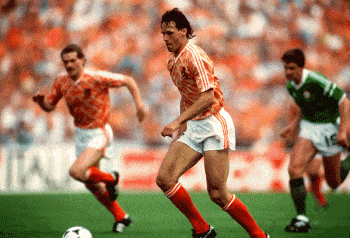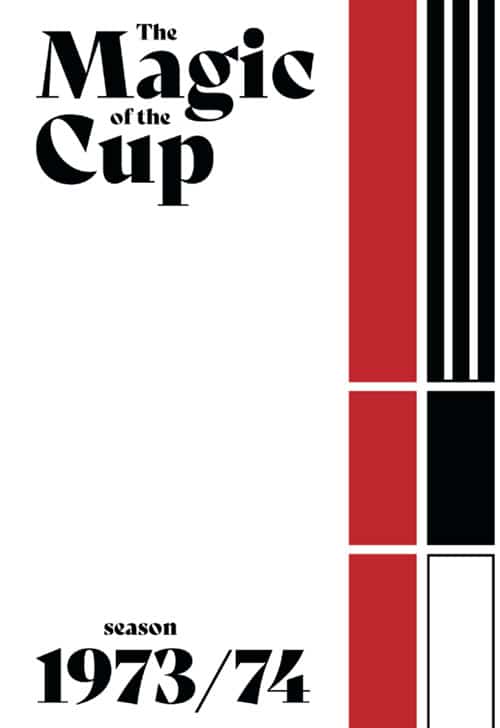In pretty well any other country in the world, Marco Van Basten would be treated as a golden God, as somebody beamed down from the heavens to bring footballing enlightenment to the nation and to the world. In the Netherlands, it’s all a little bit more complicated than that. Not only are the Dutch a people that don’t go much for hero worship, having a very healthy dose of cynicism about their everyday lives, but if they do, somebody got there before Van Basten, and there’s no shifting him – Johan Cruyff.

By Dave Bowler
Be that as it may, Van Basten was, unquestionably, the most exciting player in the world in the late 1980s, a footballer who helped transform the world game via his role at AC Milan and a goalscorer who did something that even Cruyff had failed to do – give the Netherlands a trophy at last after a decade and more of self destruction had left then empty handed despite having the ability to lift any number of the world’s glittering prizes.
1988 Euro Winner
That trophy arrived in the summer of 1988 when the Dutch carried off the European Championships, blitzing the continent with an inspirational blend of thrilling attacking football, reinventing the possibilities with a swaggering arrogance and a beguiling style of play that took the majesty of 1970s total football on into another dimension. There was no shortage of great players in that squad, and, indeed, Ruud Gullit would supplant Van Basten at the head of the game in due course, but there was no question that in 1988, it was the elegant centre-forward who was at the very pinnacle of it all.
USSR Goal
In many ways, everything you need to know about Marco Van Basten was summed up in that single goal against the USSR in the final of that competition as the Dutch finally cruised to their destiny. Breaking forward down the left hand side, Arnold Muhren played a fairly speculative cross into the Russian penalty area. In truth, it was a pretty ordinary ball in, something of a disappointment for a player of his quality given the way it drifted out way beyond the far post to an angle that was deeply unpromising, almost on the far edge of the box, about level with the six yard line.
Coming onto it, the only real option for Van Basten as he stretched was to try to hook the ball back into the centre of the area where Gullit alone was making a run forward, surrounded by a trio of defenders.
Calculating within an instant that in trying to pull the ball back, it was likely that the defender that was tracking his own run might get something on the ball and that, even if he didn’t, Gullit’s chances of making something of a cross were negligible given the defensive cover, Van Basten recalibrated his ambitions. That in itself is a remarkable feat given the pace at which these things happen, that he was playing under the pressure of the biggest game in European football and that the Dutch side were trying to put an end to their reputation as the game’s perennial bridesnaids against a very, very good USSR team.
But then comes the really good bit.
As the ball begins its descent, Van Basten stops. He steadies himself. He watches it fall out of the sky. Then with a leap that would befit an Olympic hurdler, he throws his entire weight into the ball, catching it perfectly with a flash of the right foot, a movement so fast it’s barely caught on camera, an action that combines ballerina grace and warrior belligerence in the same moment.
From his foot, the ball follows an arc that seems to deft both physics and belief, sufficient height so that it soars over the goalkeeper at the near post, enough swerve and dip such that it curves over the goal line and plummets beneath the crossbar before snuggling into the warm embrace of the net as though it were the most natural, inevitable thing in the world.
It’s one of football’s JFK moments, though somewhat more life affirming. It is almost impossible to believe the evidence of your own eyes, that such a goal is actually possible. The reactions that follow are telling. The Russian goalkeeper, dropping back to earth, stumbles and staggers like a drunken man looking for a supporting wall. In the technical area, Rinus Michels, not a man given to outpourings of joyous emotion, dashes forward, on the verge of tears, hand covering his eyes lest they be burnt out by the religious majesty of what he has just witnessed.
Serie A
Van Basten, in tandem with Gullit and Rijkaard then set about redrawing the boundaries of what was possible in Italian football, revolutionising Serie A with their swashbuckling style that simply crushed Italian caution, carrying off the European Cup to boot. But that which the Gods give, they also take away and injury brought a sadly premature end to a career which promised so much more.
In the end though, wasn’t that goal enough?
Dave Bowler is the author of “The Magic of the Cup 1973/74”, telling the story of Liverpool’s FA Cup win in 1974. Available here: https://www.curtis-sport.com/books –
Follow the magic of the cup on Twitter: @MagicOfFACup
